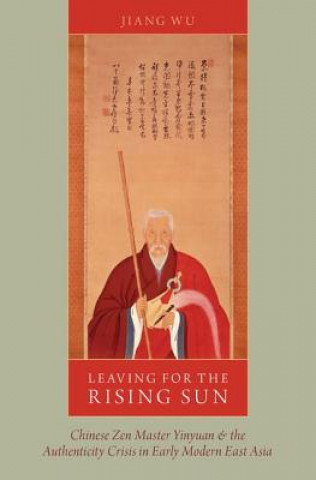
Doručenie
Nákupný poradca





Nehodí sa? Žiadny problém! U nás môžete do 30 dní vrátiť
 Darčekový poukaz
v ľubovoľnej hodnote
Darčekový poukaz
v ľubovoľnej hodnote
S darčekovým poukazom nešliapnete vedľa. Obdarovaný si za darčekový poukaz môže vybrať čokoľvek z našej ponuky.
Leaving for the Rising Sun
 Angličtina
Angličtina
 501 b
501 b
30 dní na vrátenie tovaru
Mohlo by vás tiež zaujímať


In 1654 Zen Master Yinyuan traveled from China to Japan. Seven years later his monastery, Manpukuji, was built and he had founded his own tradition called Obaku. The sequel to Jiang Wu's 2008 book Enlightenment in Dispute: The Reinvention of Chan Buddhism in Seventeenth-Century China, Leaving for the Rising Sun tells the story of the tremendous obstacles Yinyuan faced, drawing parallels between his experiences and the broader political and cultural context in which he lived. Yinyuan claimed to have inherited the "Authentic Transmission of the Linji Sect" and, after arriving in Japan, was able to persuade the Shogun to build a new Ming-style monastery for the establishment of his Obaku school. His arrival in Japan coincided with a series of historical developments including the Ming-Qing transition, the consolidation of early Tokugawa power, the growth of Nagasaki trade, and rising Japanese interest in Chinese learning and artistic pursuits. While Yinyuan's travel has been noted, the significance of his journey within East Asian history has not yet been fully explored. Jiang Wu's thorough study of Yinyuan provides a unique opportunity to reexamine the crisis in the continent and responses from other parts of East Asia. Using Yinyuan's story to bridge China and Japan, Wu demonstrates that the monk's significance is far greater than the temporary success of a religious sect. Rather, Yinyuan imported to Japan a new discourse of authenticity that gave rise to indigenous movements that challenged a China-centered world order. Such indigenous movements, however, although appearing independent from Chinese influence, in fact largely relied on redefining the traditional Chinese discourse of authenticity. Chinese monks such as Yinyuan, though situated at the edge of the political and social arenas, actively participated in the formation of a new discourse on authenticity, which eventually led to the breakup of a China-centered world order.
Informácie o knihe
 Angličtina
Angličtina




 Ako nakupovať
Ako nakupovať
























